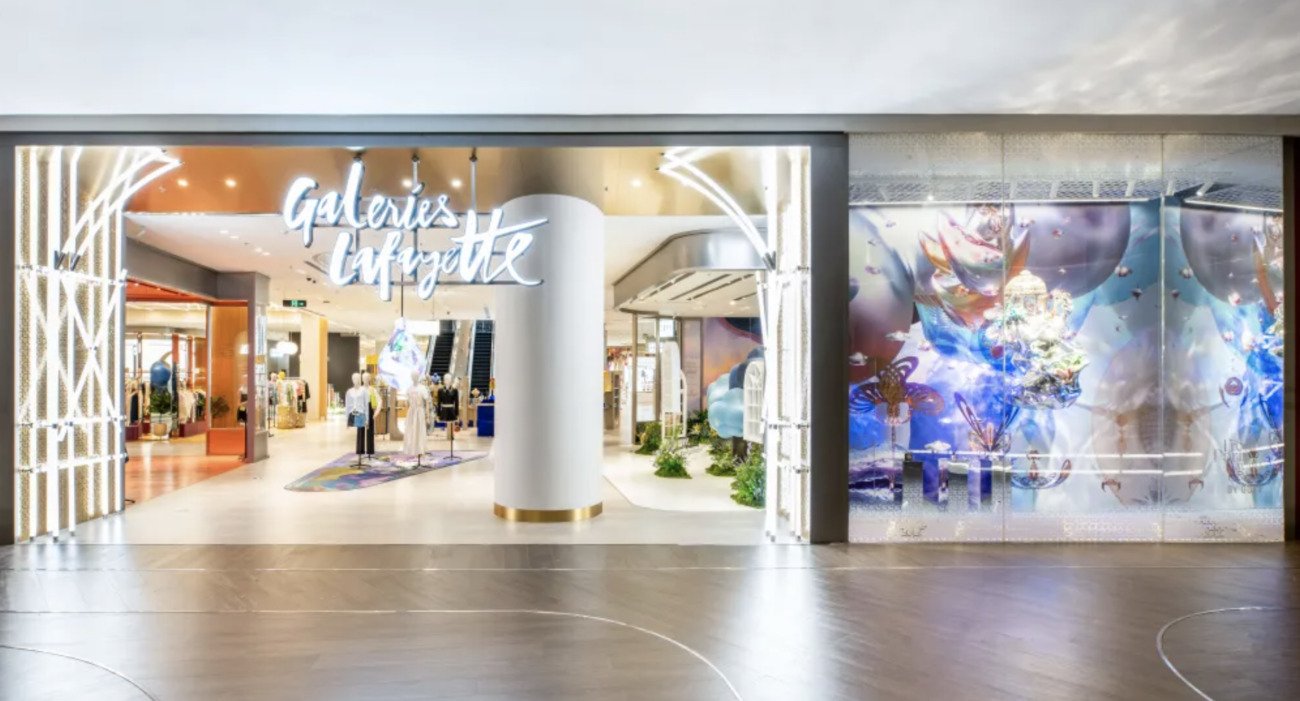The World’s Best in Retail Right Now
The concept store has changed. Once it was about selling a certain lifestyle. The new retail concept store is a space where a brand is exploring a new direction, idea, initiative or concept – if you will. These concept
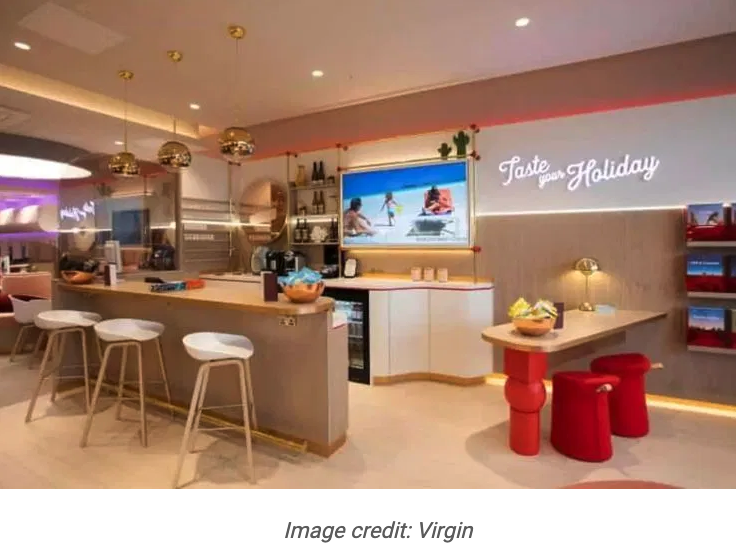
The concept store has changed. Once it was about selling a certain lifestyle. The new retail concept store is a space where a brand is exploring a new direction, idea, initiative or concept – if you will.
These concept stores are a departure from the norm for the brands. They stand apart from the rest of the store portfolio. Or they’re an ecommerce brand’s wave-making new approach. They may be testbeds, they may be wildly different to the other spaces, they may be storytelling and engagement spaces. They may be permanent spaces or pop-ups or something in between. Some approaches have even been so well received they’ve been rolled out elsewhere.
We’ve scoured the world to bring together 47 of the very best new retail concept stores out there. These are the new, inspirational approaches to retailing that we think are redefining what the concept store can be.
1. AT&T (Seattle)
Tapping into Seattle’s coffee culture and booming tech scene, this space is a bold step for the global telecomms company. The concept is a space described as a ‘second living room’, where customers or non-customers can hang out, work, host events, browse various technology or enjoy coffee and food.
It also features a custom app that links to the space, where users can order and pay for food, and link to the in-store screens and tech. Customers can even shop and collect purchases in the space by receiving a custom QR code that links to a bank of lockers built into the wall. It’s an innovative space in an industry badly in need of new ideas for physical spaces.
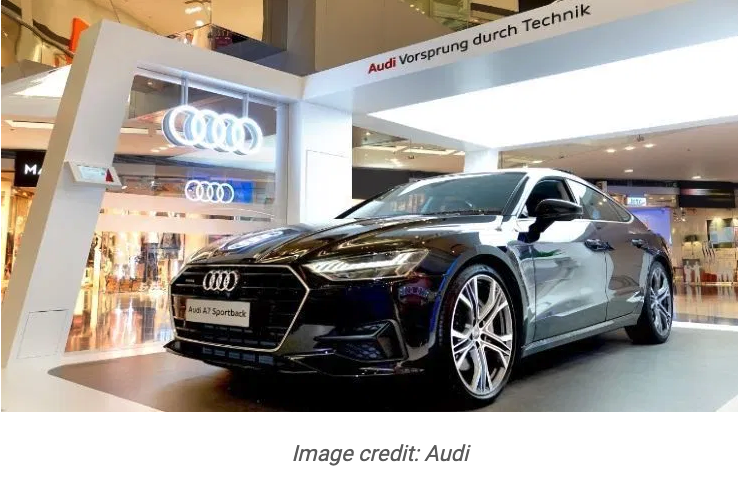
2. Audi (Hong Kong)
Luxury automotive retailer Audi has opened an ‘innovation space’ in the Festival Walk shopping mall. Following the success of its pop-up store last year, this ‘experience store’ takes customers on a journey through the use of VR, allowing them to explore the full range of models.
Customers can also preview future car concepts which only helps to build brand loyalty. Over 40 models are available for customisation here and customers can view every detail through a VR device and even take their newly designed car for a virtual spin.
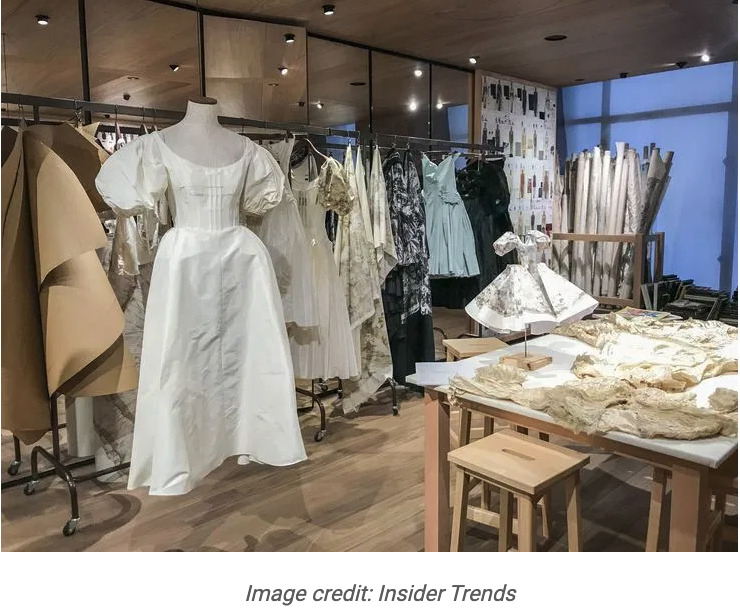
3. Alexander McQueen (London)
Alexander McQueen’s store on Bond Street is a flagship with a difference. As well as displaying the latest collections from the retailer it also features archive designs as another way to drive footfall.
Photographs and artworks are displayed throughout the store and the space hosts talks and exhibitions to inspire students and hopefully foster new fashion talent. There are plans to refresh the interiors each season with fabrics from the Alexander McQueen studio. The focus on storytelling is apparent here, with the top floor entirely dedicated to showing the history of the brand, and the stories behind specific designs.
4. Balenciaga (New York)
Luxury fashion retailer Balenciaga has recently opened a flagship on Madison Avenue. The store focuses on the concept of the space as a public domain. The theme here is Urbanism – where the environment is inspired by the city of New York. The benches and seats mimic the ones found in NYC parks and subway stations.
There is some good tech here too – with wraparound screens playing atmospheric videos. The space also features hyper-real mannequins based on 3D scans of real Balenciaga models.
The popular trend of displaying unique artworks in store is present here too. The silver sculpture by artist Tobias Spichtig takes centre stage. For a limited time, there will be an on-site graffiti artist customising customers’ Balenciaga bags – both new and old. There will also be a limited edition NYC shopping tote available here so there are plenty of reasons for Balenciaga fans to pop by.

5. Ba&sh (New York)
French fashion retailer Ba&sh has launched a brand new concept store in the Nolita neighbourhood of New York. The store is centred on customer experience and features a ‘dream closet’ where customers can choose some of the label’s signature items and ‘borrow’ them for 72 hours.
As a marketing exercise, there are plans to hold monthly events for influencers and their friends as a way of getting promoted on social media. It will also hold French lessons and pastry-making classes to draw more people to the boutique. This store has also honed in on its omnichannel experience with an app to make digital and physical shopping seamless.
6. Belstaff (London)
Luxury clothing brand Belstaff’s new flagship on Regent Street is an expression of its new community-first retail approach. The focus is on the ground floor, where customers can bring in old jackets to be repaired. This same space hosts classes on how to take care of leather and waxed clothing.
To supplement this, customers can enjoy an in-store coffee or a gin and tonic from its own bar. For a heritage retailer, this is a smart approach and it communicates its brand ethos powerfully.

7. Boots (London)
Health and beauty retailer Boots has launched a concept store in Covent Garden. The new space is the biggest makeover in the company’s 170 year history. The white marble tiled beauty hall is home to more than 300 brands and has its own YouTube studio and Instagram area where shoppers can film or take pictures with their new purchases.
It is also tapping into the sustainability trend and has installed its first ever water tap where customers can fill up water bottles free of charge. Other initiatives include a shampoo refill station and ditching plastic carrier bags for brown paper bags. The retailer is hoping to learn what people love about the store so it can be a blueprint for future stores.
8. Celine (New York)
Luxury fashion retailer Celine has opened a flagship concept store in New York. Located on Madison Avenue, it is another excellent example of the trend for discovery retail.
The artwork is adapted to the location, and the store’s aesthetic is very striking with a beautiful spiral staircase, framed with slats of glass and wood. The rest of the store is minimal which contrasts well with the art installations. As is the current trend in luxury fashion at the moment, the brand has also revamped its stores in Milan, Tokyo and LA to better represent the label.
9. Chanel (Paris)
Chanel’s new flagship in Paris is essentially a test space for its newest digital initiatives. The luxury brand has partnered with Farfetch to trial clientelling tools that use data to create personalised shopping experiences.
For customers, these are accessed via the Chanel app – and the store is highly focused on its top tier customers. In fact the two top floors of the store are dedicated to VIP customers only, with personal styling rooms and a restaurant exclusively for private meals.
10. Cos (London)
Set in the new Coal Drops Yard shopping area in Kings Cross, H&M-owned fashion retailer Cos has a store that is more like an ongoing exhibition. This hybrid space works as both a special edit of their collection and a destination for art and design.
The unique brand experience hosts work from both established and emerging artists to entice customers into the store. As well as curating its own collection, it also offers limited edition prints, a selection of books and other products from brands with a story to tell. The addition of other products, all curated by Cos, gives customers a better insight into the lifestyle of the brand.
11. Crate and Barrel (Chicago)
US furniture and homewares retailer Crate and Barrel has launched a restaurant in its Chicago store. The concept has been a proven success story for other stores in their bid to drive footfall.
Restaurants are a great way to keep customers in-store for longer and ‘The Table at Crate’ has the added perk that most of the items in the restaurant can be bought within the store. The retailer has partnered with local chef Bill Kim to manage the dining area. The space will then be used for other activities outside of restaurant hours such as cooking demonstrations to really make the most of the initiative.
12. eBay high street store (Wolverhampton, UK)
eBay’s first foray into bricks and mortar retailing earlier this year was a fascinating step forward. The so-called ‘Home Grown’ concept store featured a different group of independent retailers each week.
Each retailer was typically an ecommerce business so had its first chance to test its wares through physical retail, and eBay complemented the experience by offering retailers workshops, training and mentoring on various topics.
It’s all part of eBay’s ‘Retail Revival’ pilot scheme, which works with small businesses to help them grow digital sales and show how online and offline can work together effectively. For other ecommerce giants and platforms, eBay’s experiment is significant as it shows how they can do more to support the smaller businesses they’re sometimes accused of overshadowing.
13. Everlane (New York)
Fashion retailer Everlane has opened its largest store to date and it’s packed with lots of new features. Located in fashionable Williamsburg, the store is minimal in design which is a nod to its origins of being an online retailer. The store also features a lot more tech including the option to reserve items online for pick-up in-store.
There are tablets located around the store where customers can shop the full collection and a mobile fitting room system called ‘Save My Spot’, where customers simply text what they want to try on and are notified when the changing room is ready. The store is also home to the retailer’s first ever men’s floor. With this store Everlane really is attempting to master the omnichannel experience.
14. Foot Locker/Nike (New York)
Sports retail giants Footlocker and Nike have teamed up to create the latest Footlocker Power Store. The new Washington Heights store has been fully integrated with the Nike mobile app in a brand first.
The partnership means that all the benefits of the app such as scanning in-store products for inventory or reserving items for pick-up are all available here. It also has the benefit of creating brand connections in the neighbourhood it’s serving.
Some unique features to the store are the ‘Unlock Box’, where loyalty programme members can get access to limited edition gear, as well as a ‘Shoecase’ for early sneaker releases. It’s a great way to build customer relationships and enhance brand loyalty.
15. Freitag (Zurich)
German-Swiss bag brand Freitag has opened a micro factory store in Zurich’s District 4. The concept gives customers the opportunity to create their own one-of-a-kind version of the brand’s famous tarp bag.
Supervised by staff, customers gets to interact with the tools and the machinery to create their very own piece. The bags are made from recycled truck tarp and fully compostable textiles. The space provides visitors with an engaging and unique experience but it also educates them on the sustainable making processes that the retailer is so passionate about.
16. French Connection Studios (London)
The new home of French Connection on Duke Street features exclusive products designed only for this space, with a limited number of each style available. Offering menswear, womenswear, homeware and fragrances as well as books and magazines, it has partnered with artisan coffee shop Fernandez and Wells to offer food and drink too. It’s also home to a photography studio, which aims to shoot digital and influencer content and create some buzz around the brand.
17. Gymshark Hub (Solihull, UK)
British sportswear retailer Gymshark have launched a £5 million tech innovation hub near to its Headquarters. The former warehouse has been redesigned with the goal of being seen as the best gym in Europe. The space is designed to support the brand’s focus on social media and working with influencers.
The space also boasts an auditorium, research and development factory and several high-tech photography studios which will support the launch of Gymshark’s new fitness app. It’s a creative space where Gymshark can test out new products and ideas.
18. H&M (London)
H&M’s store in Hammersmith certainly stands out from its other stores. Designed to be a more aspirational shopping experience, the store is also tapping into the sustainability trend. The store is full of greenery and has lots of sustainable messages displayed above till points.
There is a ‘Repair and Remake’ station which encourages customers to recycle garments. It’s free for customers who are part of the H&M Club loyalty scheme and it offers personalised embroidery starting from £3. It’s the first UK H&M store to have self-checkouts and there’s an in-store app – where customers can check store availability and sizing.
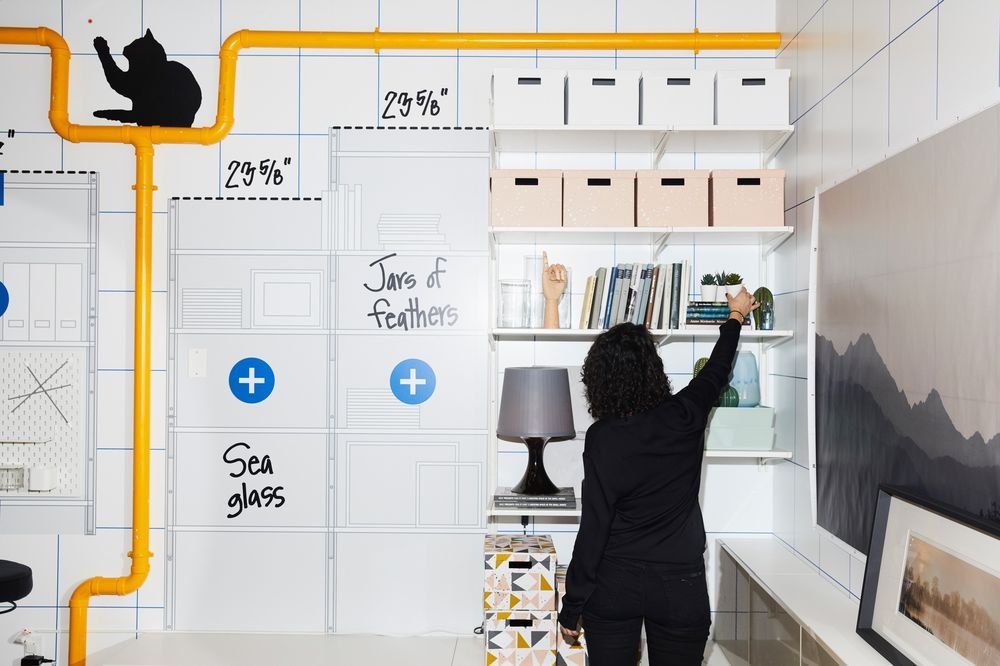
19. IKEA Planning Studio (London)
The first IKEA Planning Studio on Tottenham Court Road is a bid to make IKEA more accessible. The mini store has been designed to suit the needs and lifestyles of people living in cities. The store offers personalised and tailored services focusing on the most used rooms in people’s homes – the kitchen and bedroom.
Customers can book free a design appointment with 3D planning tools to design their dream living space. IKEA stores have historically been in out of town locations so this is opening up IKEA to a new type of customer as well as current shopping trends. The concept has now been extended to other locations including New York and Paris.
20. Levi’s (New York)
Iconic denim retailer Levi’s launched a flagship in Times Square that is its largest store in the world. It’s home to its largest Tailor Shop where customers can sit at the customisation bar with iPads to see how items would look when personalised. They can look through customisation options from local artists or sit down with a Master tailor – it’s retail theatre at its best.
The space makes for great brand storytelling and is full of references to Levi’s in cultural history on digital screens and posters around the store. It also sells merchandise unique to the location which makes sense for such a busy tourist spot.
21. L’Occitane’s 555 (New York)
Beauty retailer L’Occitane’s concept store at 555, 5th Avenue was launched with a heavy focus on experience. The space is packed full of flashy tech with a dedicated social media area and a live feed of the retailer’s U.S. Instagram account.
The store is full of fun experiences – you can ride (stationary) bikes against a backdrop of Provence or take a virtual hot air balloon ride through the South of France. The rain-shower sink takes centre stage and customers are invited to test out products here.
It’s a fantastic store for the retailer to test out new ideas whilst being able to continually adapt the space with new product launches and campaigns. It also beautifully tells the story of its origins.
22. Lululemon (Chicago)
Lululemon’s brand new ‘experiential’ store in Chicago is also the retailer’s biggest ever store. The huge 20,000 sq ft space is home to a restaurant, yoga and meditation space and a concierge desk. The studio will hold guided meditation classes and hip-hop yoga. They also plan to hold events such as movie screenings and concerts to give the space a real community feel.
Another clever way it is enticing customers into store is by offering them the unique opportunity to try out Lululemon product in its workout classes, free of charge. This way customers can see the benefits of its technical gear in action.
23. Lush (Manchester)
Lush has launched a high-tech ‘Naked’ store in Manchester in an effort to reduce packaging. Customers are able to scan items in store via the LushLabs app to reveal detailed ingredient information and ‘how to use’ instructions digitally. The app uses the ‘Lush Lens’ feature and machine learning to recognise every product in store via shoppers’ smartphone cameras.
The retailer invites NGOs and activist groups that work on reducing waste and plastic pollution into store to educate both staff and customers. It shows that this is more than a token gesture from the retailer but instead something it truly believes in. There is a financial gain for Lush too – the money saved on packaging can be put into ingredients instead. The Naked model can also be seen elsewhere around the world now.
24. McDonald’s (London)
Fast food giant McDonald’s is piloting a take-away only service on Fleet Street in central London. There is no seating, a reduced menu, and the goal is to get customers in and out of the store as quickly as possible.
Customers use a touch-screen kiosk to place orders in the stripped-back space, and the whole experience is deliberately different to its typical newer spaces which have aimed to be more engaging, social spaces.
25. M.MLaFleur (New York)
Luxury women’s apparel retailer M.M.LaFleur has opened a new store concept in Manhattan’s financial district. The retailer was originally an e-commerce styling service that moved onto showroom experiences.
The new space is working on fulfilling the needs of the area – its location in the financial district means providing core ‘work-wardrobe essentials’. The smaller format operates more like a traditional retail space where customers can take their purchases away from the store, rather than having them shipped like in previous stores. Items can also be returned and exchanged here. The whole process has been designed to make life easier for its target customers.
26. MUJI pop-up (New York)
Japanese retailer Muji has launched a design and retail pop-up store in SoHo. The space is there to showcase the design history of the brand as told through classic MUJI products from its archive and an exhibition of its posters throughout history. Muji’s natural and simple design is as relevant today as it was when it first started.
Videos in store showcase its global initiatives including the MUJI hotel and MUJI diner. There is also a selection of homewares for sale. The display of the most iconic MUJI products includes pens, travel items and storage solutions. The posters showcase MUJI’s history of graphic design, featuring work by Ikko Tanaka. For fans of the brand, or design itself, it’s an interesting concept to check out.
27. Natuzzi AR store (New York)
Italian furniture brand Natuzzi has launched a virtual reality shopping experience. The AR store can be found at its Madison Avenue showroom. Here customers can enter a digital drawing of their home and decorate it with Natuzzi pieces.
By using Microsoft’s Hololens 2 headset, customers can interact with the environment and move furniture around, as well as changing the colour of items. And if that isn’t enough, customers can view a scaled down hologram of their homes on a tabletop for a birds-eye view of the space. This deeper engagement for customers means the store can build better connections which can only help build repeat custom.

28. Nike House of Innovation (New York)
Nike’s House of Innovation on 5th Avenue is a direct response to customers seeking experiences. For a start, you’ll need to download the Nike app to enjoy the touchpoints in-store and get the most out of the experience. Technology plays an important role here; if you see an item you like on a mannequin then you can scan the QR code to find out what sizes and colours are in stock.
Customers can virtually shop the store through their phones. There is also instant checkout on the app, so no more waiting in line. The Customization Bar is here too, so customers can create their unique sneakers. Such a personal and responsive store not only creates theatre, but provides a better, faster and more engaging in-store experience.
29. Nordstrom Local (LA)
Luxury department store Nordstrom opened its first ‘local’ concept in Melrose and has since gone on to open a further four stores in LA and NYC. The stores serve as hubs for buying online and picking up orders. There is no inventory for sale, instead there are personal styling services and alterations available. Shoppers can pick out their favourite looks online and have the items waiting in-store for them to try on without obligation to purchase.
There are lots of great initiatives to entice people into the store, such as the gift wrapping service and refreshments. There is also an area set aside for showcasing products from popular brands. They are really multifunctional spaces that perfectly display what the brand can offer.
30. Nordstrom Men’s Store (New York)
Nordstrom’s first exclusively men’s store in New York has already been a big success, with a focus on young customers and outstanding service. Customers can return items at the front of the store within two minutes and enjoy same day delivery from the store for $20. It’s also rumoured that staff will open the store after hours for customers desperate for particular items.
The space also features fast pick-up for online orders and a number of initiatives that offer convenience to busy New Yorkers. It’s another great example of how Nordstrom is flexing its mix of bricks and mortar stores to better suit a world of omnichannel retail.
31. Oxfam (Oxford, UK)
The charity Oxfam has opened its first superstore on the outskirts of Oxford in a bid to change the perception of charity shops. The location, on a retail park, is a destination with the retailer’s first on-site café and a changing menu of ‘world foods’.
Through local company Rework, it will sell second-hand white goods with a one-year warranty, for the first time. There is also an area devoted to online sales – where high value and sought-after items will be photographed for posting on Pinterest and other social media platforms in an effort to raise as much money as possible. The store will also act as a community space offering free talks and events to help spread the charity’s message.
32. Rouje (Paris)
Digital fashion brand Rouje has opened its first physical store in Paris, and as is often the case with digital-first brands, it’s no ordinary store. It features its own restaurant next door, Chez Jeanne, named after the founder Jeanne Damas. Jeanne Damas is the daughter of a brasserie owner, and is offering classic French brasserie food in a nod to her heritage. For her, food and Rouje go hand in hand, and there’s no better way of communicating that chemistry.
33. Sainsbury’s experimental superstore (Birmingham, UK)
Sainsbury’s most experimental store to date, based near Birmingham, has been 10 years in the making. It’s somewhere between a department store and supermarket, featuring a number of partnerships with other brands. They include its first Oasis concession, Habitat and Argos stores, and a large dine-in ‘Food Market’.
Sainsbury’s has experimented with smaller versions of some of these ideas before, but this is the first time it’s committed to such a multi-faceted space. As a result, the in-store experience is radically different.
34. Saint Laurent Lab (Paris)
Saint Laurent’s new ‘Lab’ features the usual mix of men’s and women’s ready to wear ranges. But interestingly, it also sells a huge range of collectibles, including furniture, books, vinyl and art, plus novelty items such as skateboards, yoga mats, stationery, lighters and phone cases.
The space also features a coffee counter at the front to lure in customers. The product mix will frequently change to test different ranges, and this ‘lab’ approach, based on data collection, will be rolled out to other stores.
35. Samsung KX (London)
Samsung’s much hyped new space at Coal Drops Yard in Kings Cross is essentially a marketing space for the brand. There are no tills, and instead the space is packed with hallmarks of experiential retail, including gaming lounges, co-working spaces, DJ booths, an event space and personalisation bars to design your own products. It also features a digital graffiti wall, a ‘kitchen of the future’ and a travel photography workshop. This is a pure engagement space, designed to bring technology to life and to encourage visitors to play.

36. Starbucks Reserve (Tokyo)
Coffee giant Starbucks has unveiled a high-end Reserve store in the Ginza district. The ‘Reserve’ status means that it will be serving high-quality coffee with the beans coming from the Starbucks Reserve Roastery in Tokyo.
It’s different from a regular Starbucks store in other ways too. The space has been designed for groups to come and enjoy a meal, rather than a quick coffee. It has created more comfortable seating and tables are more spaced out to make dining a more enjoyable experience. To make it feel even more like a restaurant the store is also accepting dinner reservations.
37. The Body Shop (London)
Cosmetic retailer The Body Shop has unveiled a new store on Bond Street that reinforces its mission statement. The slogan ‘speaking out since 1976’ references the retailer’s founder, Anita Roddick, who opened the first store in Brighton which was famous for never testing on animals and supporting environmental issues.
Although that remains true to this day, the heritage of the brand has been lost until now. This store wants to remind customers of its ‘activist roots’. The store features refill stations, water bottle refills, recycling points and an ‘activism corner’ – here customers can join local and global activist groups and spread the word on social media. The concept for this store is to create a community hub for like-minded individuals and promote the message that its products are environmentally friendly.
38. The Container Store Custom Closets (LA)
The Container Store has opened its first Custom Closets store on the site of its existing store at the renowned Farmers Market in LA. The store has been fully redesigned and remodelled as a new way to shop its closet solutions. The Custom Closets represents more than 50% of the retailer’s business so it makes sense that it has focused the business here.
There are more than 70 real-life displays of the different closet options and the launch strategically follows the launch of its fourth closet line called Avera. The new store has been designed for both designers and customers to visualise the options. The Custom Design service has made it easier than ever to shop the closet solutions. Designers are also invited to use the space for client meetings creating a welcoming space for both the industry and customers alike.
39. The North Face (New York)
Outdoor clothing retailer The North Face has opened a store in SoHo to showcase its new retail strategy. The store is designed to create experiences to form stronger bonds with customers. The space tells the story of the brand as opposed to just being a place where a transaction takes place.
The store is premium, long-lasting and sustainable which is a nod towards its product. The museum-like archive of expeditions, classic products and staff guides will help customers find the right gear for their next adventure as well as gaining some insight into the values of the brand. As you come to expect with concept stores, there are exclusive products to be found here too.
40. The Perfume Shop (Sheffield, UK)
The Perfume Shop’s first experiential concept store is trialling some really innovative initiatives. It features a centrally located ‘perfume wheel’ with sensors that customers can touch and feel, as well as smell different scents. There are also centred funnels with iPads to help customers build their preferences.
Elsewhere, a personalisation station allows customers to decorate and engrave their bottles, and a huge chandelier made of perfume bottles has become a big hit on Instagram. It’s great to see a traditional high street retailer experimenting with genuinely innovative experiences.
41. Thirdlove (New York)
Direct-to-consumer lingerie company ThirdLove has opened its first physical store in SoHo. Although this store is a pop-up, it’s a fantastic example of an online retailer bringing something completely new to the bricks and mortar experience.
The San Francisco-based retailer uses a data-first and body inclusivity approach to bra design. The temporary store will allow the brand to gain customer feedback and build better information for its online quiz Fit Finder, something which cannot be captured online. The physical store is really a way of fulfilling a task to drive online sales.
42. Tiffany (Tokyo)
Luxury jeweller Tiffany & Co has a new concept store in Tokyo that’s unlike any other Tiffany store. It’s located on Cat Street, in an area popular for used-clothing shops and athletic brands rather than with other luxury retailers.
Instead it is targeting a younger customer with photo booths and an American retro-themed diner with hot dogs on the menu. The store is also exclusively releasing pendants engraved with the location’s unique logo which you won’t be able to buy anywhere else in the world. It’s a much more informal and playful store than other Tiffany locations, but still communicates the world of the brand beautifully.
43. Tim Hortons (Toronto)
Canadian fast-food chain Tim Hortons has launched its first ever ‘innovation café’ in downtown Toronto. The store, located at the base of the Exchange Tower, has been designed as a space to test out new menu items and technology initiatives.
A video wall greets customers on arrival and there is wireless charging integrated into seating. The self-order kiosks and dedicated mobile order pickup area speeds up the process for those short on time.
Other initiatives include a ‘Brew bar’ with seven different coffee brewing methods and a focus on sustainability. The store is offering 100% compostable cutlery, coffee cups made from 30% post-consumer recycled material, and china and glassware for dine-in customers. This store reflects what customers are coming to expect from retailers.
44. Virgin Holidays (Milton Keynes, UK)
Virgin Holidays has launched its most experience-led store to date, and it might surprise you to hear that it’s in Milton Keynes. As soon as you enter the store you cannot fail to notice the virtual roller coaster which will transport you to some of Virgin’s most exotic locations.
You can also sit in Premium and Upper Class seats whilst you sip on champagne during a consultation with a travel expert. There is even an area for little ones to enjoy entertainment and games. Better still, you can have a Virgin signature red manicure at the Clubhouse spa, all designed to get you in the holiday mood.
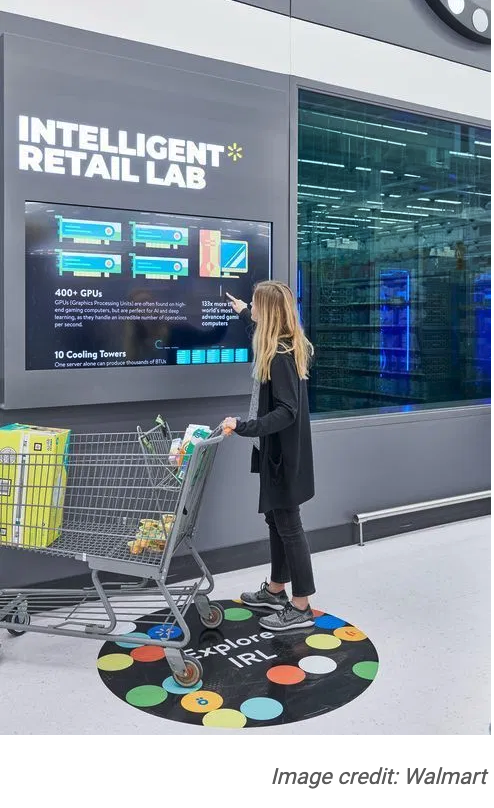
45. Walmart Test Lab (New York)
Walmart’s new ‘Intelligent Retail Lab’ (IRL) in New York is a fascinating and experimental retail space, filled with futuristic tech. It features AI-enabled cameras, interactive displays and a huge data centre, all built to showcase what AI can contribute to shopping experiences. Sensors and cameras monitor product inventories in real time, and notify staff on precisely what to re-stock and when.
There are also a number of educational displays to inform customers about IRL, its purpose and how AI can be beneficial. There is even an interactive, AI-powered interactive display that mirrors customer movements – an easy way of showing the fun side of sci-fi tech. Importantly, all of this vital data collection and learning is happening in an extremely busy location with high footfall, meaning Walmart is gathering meaningful insights into retail’s future.
46. Whole Foods (Chelsea, New York)
The new Whole Food store in New York focuses on its ‘grab and go’ concept. Although the store will still sell a selection of its raw ingredients, the focus is on prepared foods, including an acai bowl station, paninis and other hot dishes.
As well as appealing to lunching locals, the idea reflects a growing trend for supermarkets and wholesalers to showcase their ingredients in the best way possible – by showing off how delicious they are when combined in great recipes.
47. Zara (London)
Fashion retailer Zara has a flagship in London’s Westfield Stratford store that has been coined ‘the store of the future’ and it’s easy to see why. The pioneering digital store is super high-tech and merges online and the physical store in line with Zara’s business model. By investing in advanced technology, the retailer is making the customer experience as flawless as possible.
In a Zara world-first, there is a dedicated online area for purchasing and collecting online orders. There are also automated collection points where you scan the QR code or pin code on your e-receipt – your order can be delivered to you in seconds by way of a behind-the-scenes robotic arm. Other cool tech includes the interactive mirrors equipped with RFID, which can detect items held by customers and offer more information as well as outfit suggestions.
Via InsiderTrends
 English
English

























